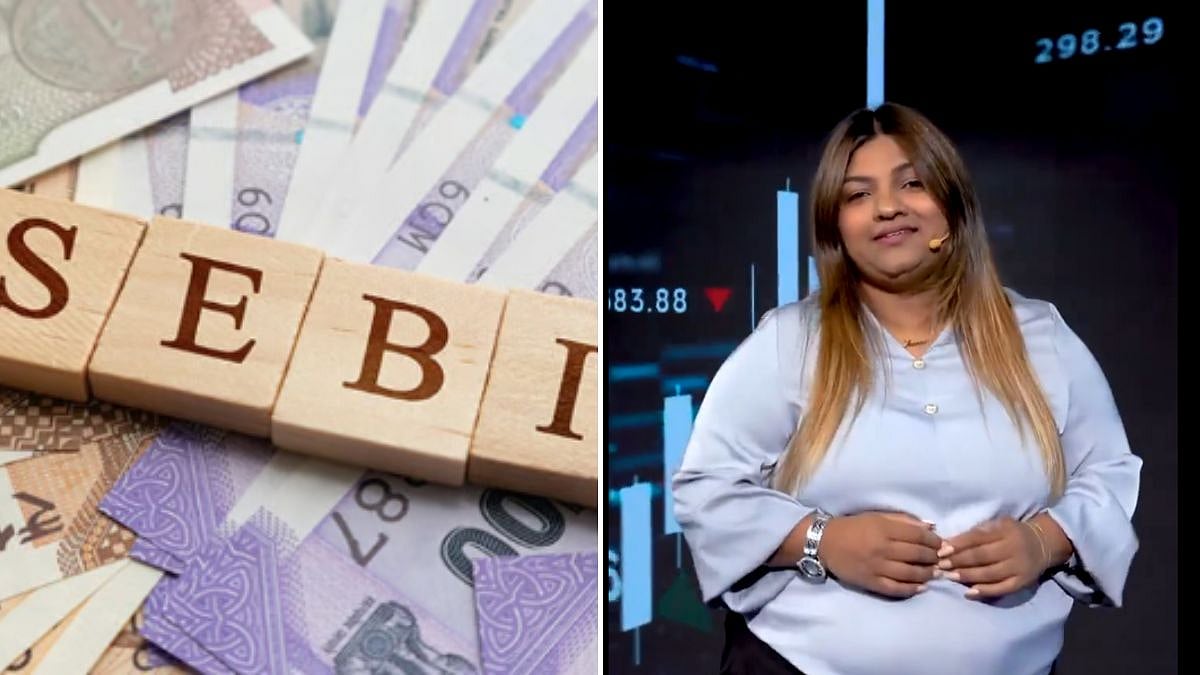SEBI (L) & Asmita Patel, self-styled as the “She Wolf” of the stock market and revered as the “Options Queen” (R) | File Pic & X/@Vismaya9999
Mumbai: Their nicknames sound like catchy jingles on FM radio—“Baap of Charts” and “She Wolf”—but when it comes to the cut and thrust of the securities market, even the snazziest monikers can’t save you from the long arm of the law. SEBI—the vigilant sentinel of the financial realm—has long eyed such finfluencers with a skeptical gaze.
After pinning down the Baap of Charts, Mohammad Nasiruddin Ansari of Hyderabad, with his promise of “quick profits” that turned 2023 into a roller coaster of regulatory drama, the latest target on SEBI’s radar is none other than Asmita Patel, self-styled as the “She Wolf” of the stock market and revered as the “Options Queen.”
On Thursday, SEBI issued an order that sent shockwaves through the finfluencer community. In a move that was anything but a mere slap on the wrist, the regulator impounded a staggering Rs 53.67 crore from Asmita Patel Global School of Trading Pvt Ltd—just a slice of the Rs 104 crore allegedly earned through unregistered investment advisory services. And it wasn’t just about the money: the order imposed a full-blown ban on Asmita, her spouse Jitesh Jethalal Patel, and four other affiliated entities from ever setting foot in the securities market again. Behind the guise of offering “educational courses” lurked the disconcerting reality of doling out unauthorized buy-sell recommendations—advice that, by all accounts, demanded proper regulatory registration.
The rise of these so-called financial influencers—affectionately dubbed “finfluencers” or, as some might wryly term them, “funancial influencers”—has been a hot topic on SEBI’s radar for quite some time. Once heralded as modern-day mentors and symbols of financial empowerment, the likes of the Baap of Charts and the She Wolf have now become cautionary tales. In today’s world, where every influencer’s tweet has the potential to spark a buying frenzy, their meteoric rise and dramatic fall remind us that, in the fast-paced realm of finance, ethics and regulation aren’t mere accessories; they form the very bedrock of market integrity.
SEBI’s findings on the She Wolf were as meticulous as they were damning. Leveraging an impressive digital following—526,000 YouTube subscribers, 290,000 Instagram fans, 73,000 Facebook followers, 1,900 LinkedIn connections, and 4,200 X (formerly Twitter) devotees—Asmita Patel built her trading school into a veritable online phenomenon. Through her website, asmitapatel.com, she rolled out a suite of paid courses such as “Let’s Make India Trade” (LMIT), “Master’s in Price Action Trading” (MPAT), and “Options Multiplier” (OM), all designed to equip aspiring traders with top-notch guidance and strategic insights. However, what started as an educational venture soon raised eyebrows.
An investigation triggered by complaints from 42-course participants uncovered that the school wasn’t merely about imparting knowledge—it was also dishing out specific stock trading advice. Students were reportedly being steered to trade in designated stocks and encouraged to open trading accounts with a particular firm, while stock tips were being circulated through Telegram groups. It turns out that the course fees—routed through a labyrinth of third-party entities such as King Traders, Gemini Enterprise, and United Enterprises—read like the ingredients for a regulatory disaster. Was it education or exploitation?
Asmita passionately portrayed herself as a champion of financial literacy—an altruistic crusader on a mission to empower everyday investors—SEBI painted a decidedly different picture. The regulator’s probe uncovered a business model built on unregistered advisory services and a series of misleading promises, rather than the genuine educational content Asmita had so ardently claimed to offer. The regulatory hammer had indeed fallen— not only on a charismatic mentor with an alluring social media following but on an entire ecosystem that blurred the lines between legitimate education and speculative, often deceptive, financial advice.
